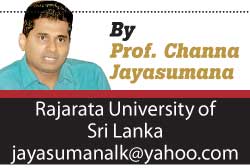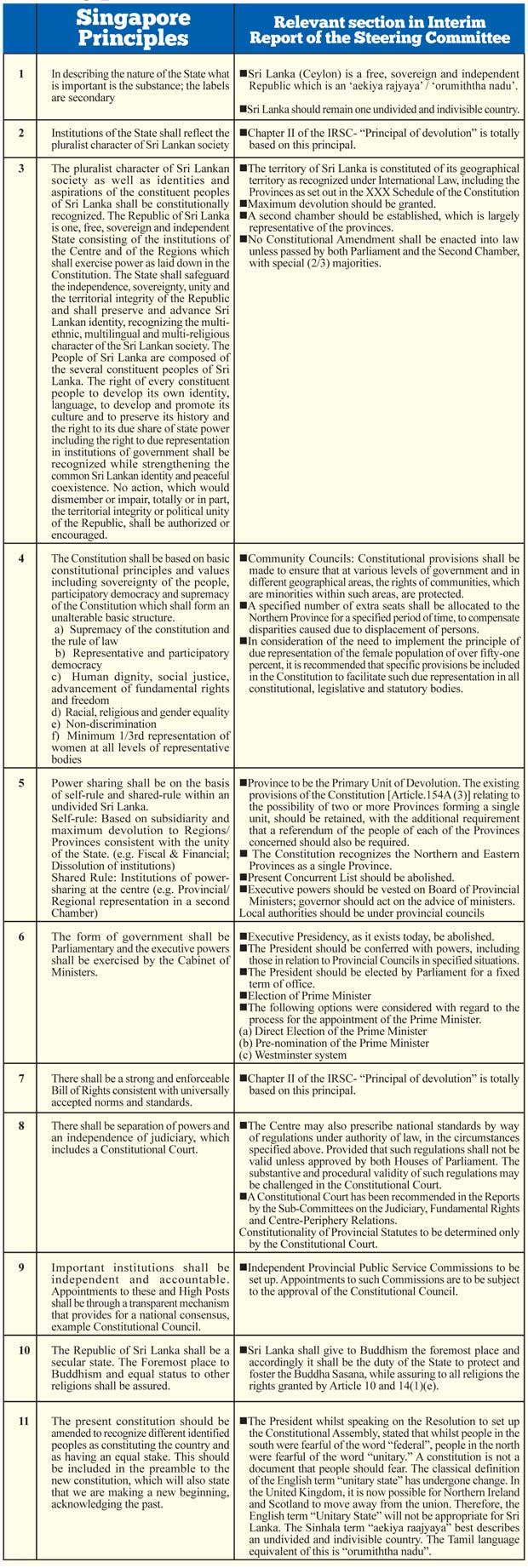Who is really behind the New Constitution-making process in Sri Lanka?
Posted on October 31st, 2017
By Prof Channa Jayasumana Courtesy The Daily Mirror
There is currently a debate about the drafting of a ‘New Constitution’ for the country among the academic community and the general public in Sri Lanka. This started with the appointment of a 19-member Committee headed by Lal Wijenayake called the Public Representations Committee on Constitutional Reforms. Its report was released in May 2016.
Meanwhile, a Constitutional Assembly was established by a parliamentary resolution on March 9, 2016 and a 21-member Steering Committee chaired by Prime Minister Ranil Wickremesinghe was appointed thereafter. The Steering Committee had its first sittings on April 5, 2016.

The Steering Committee recognized 12 main subject areas and assigned six of those subjects to sub-committees appointed by the Constitutional Assembly. The reports of the six Sub-committees were presented on November 19, 2017. Interim Report of the Steering Committee deliberates the remaining six subjects that were not assigned to any Sub-committee published on September 21, 2017.
The basic principles and facts mentioned in the IRSC were previously discussed and agreed at two workshops held in Singapore. The first was held from Aug. 31 to Sept. 1, 2013 the second between the 3 and 5 of April, 2015
 I have gone through Wijenayake Committee Report, the six Sub-committee reports and the Interim Report of the Steering Committee (IRSC). After considering the academic achievements and the capacity of a majority of the members in both the committees, incertitude appeared in my mind whether the reports were original or were prepared with external help. Hence, I did research on my own and found some interesting connections.
I have gone through Wijenayake Committee Report, the six Sub-committee reports and the Interim Report of the Steering Committee (IRSC). After considering the academic achievements and the capacity of a majority of the members in both the committees, incertitude appeared in my mind whether the reports were original or were prepared with external help. Hence, I did research on my own and found some interesting connections.
The basic principles and facts mentioned in the IRSC were previously discussed and agreed at two workshops held in Singapore. The first was held from August 31 to September 1, 2013 followed by the second between the 3 and 5 of April, 2015. Those events were organized by a South Africa -based INGO called ‘In Transformation Initiative’ (ITI) with the help of the Government of Switzerland.
According to the ITI website, it promotes the principles of the South African peace-making model to support, advise, and assist democratic transition and conflict resolution in Africa and around the world. ITI was actively involved in activities in Sri Lanka, Northern Ireland, Colombia, Cuba, Madagascar, Zimbabwe, Kenya, Cyprus, Sudan, South Sudan, Yemen, Iraq, Spain (in the Basque region), Bahrain and India (on the Naga question).
Further it says it has partnership with Burgh-of Foundation” an INGO with a questionable history in Sri Lanka.
ITI has four Directors: Roelf Meyer, Mohammed Bhabha, Ivor Jenkins and Ebrahim Ismail Ibrahim. Roelf Meyer was a one-time Minister of Defence of the F.W. de Klerk Government in South Africa. He later became Minister of Constitutional Affairs and Communications under Nelson Mandela’s government.
According to the ITI, Meyer is a consultant on peace processes in Sri Lanka, Rwanda, Burundi, Kosovo and Bolivia. Paradoxically he is also on the Board of Directors of ‘Armscor Corporation of South Africa’, which supplies all the needs of South Africa’s Department of Defence.
Armscor was originally established in 1968 as an arms production company. Mohamed Bhaba, an Attorney-at-law, was part of the African National Congress (ANC) negotiating team for the final South African Constitution and a former member of South African parliament.
Ivor Jenkins was Director of Kutlawanong Democracy Centre, a part of the Institute of Democracy of South Africa.
The Steering Committee recognized 12 main subject areas and assigned six of those subjects to sub-committees appointed by the Constitutional Assembly. The reports of the six Sub-committees were presented on November 19, 2017
Mohomad Ebrahim is a former member of the armed wing of the African National Congress, He was arrested in 1963 and charged under the sabotage act and sentenced to 15 years on Robben Island. According to the ITI, members of the Tamil National Alliance (TNA) including M.A. Sumanthiran MP, members of the Global Tamil Forum, V.T. Thamilmaaran, a senior lecturer in the Department of Public and International Law of the Faculty of Law at the University of Colombo, Jayampathy Wickramaratne, Mangala Samaraweera MP, a member from Sri Lanka Muslim Congress and an observer from the Government of Australia were among the participants at the Singapore meetings.
A 10-point document was prepared following the 2013 meeting, and it was named as ‘Singapore principles’. It was further discussed and improved at the April 2015 meeting. The final agreement has 11 points. Here is a comparison between the so-called Singapore principals and the Interim Report of the Steering Committee (IRSC) where symmetry of the concepts is obvious.
Although several parties claim that the New Constitution-making process is genuine and rooted in Sri Lankan soil this comparison clearly shows a different scenario.
Who is really behind the New Constitution-making process in Sri Lanka?

October 31st, 2017 at 3:25 pm
Another good scientific analysis by Prof Jayasumana.
However, concurrent to Singapore Principles there was Wijerama Principles. They are twins as both were born around the same time in different places. In the long term, Wijerama Principles take the nation where Singapore Principles aspire. In short they can be called “13 Plus”.
Government plan is simple. They will use the new constitution to terrorize the public and quietly pass 13 Plus. All three living presidents support 13 Plus.
November 1st, 2017 at 5:57 am
Thank you Professor for exposing these rouges.
They harp on the unitary status granted to the state and the foremost place accorded to Buddhism while hiding the fact that they nullify theses by consequent phrases.
For the moment they seem to b e concentrating on getting federal leaving separation for a later date which will only be a matter of formality.
November 2nd, 2017 at 3:06 am
Someone (MP = people’s representative) should ask the question in parliament to clarify whether these talks between Jayampathi Wickmanayake, Mangala Samaraweera etc and Tamil Diaspora took place in Singapore. These are the things JO should highlight rather than threaten the the parliament to be bombed.